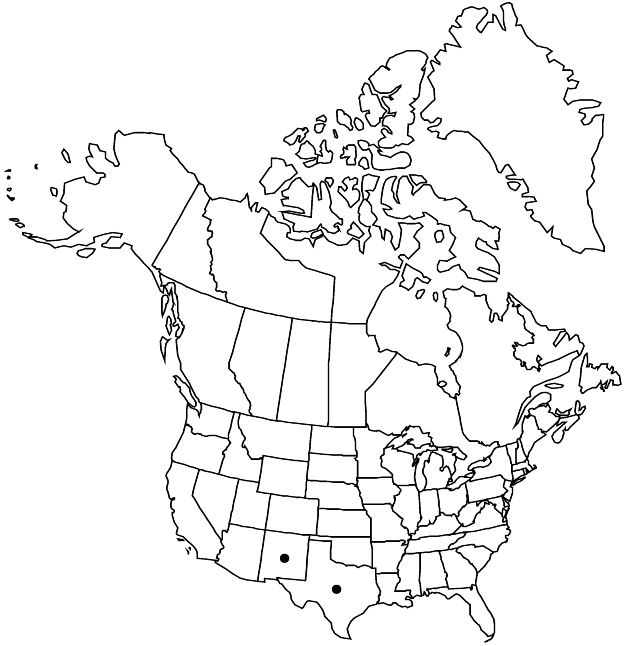Difference between revisions of "Ayenia pilosa"
Opera Lilloana 4: 185, fig. 65. 1960.
FNA>Volume Importer |
imported>Volume Importer |
||
| Line 47: | Line 47: | ||
|publication year=1960 | |publication year=1960 | ||
|special status= | |special status= | ||
| − | |source xml=https:// | + | |source xml=https://bibilujan@bitbucket.org/aafc-mbb/fna-data-curation.git/src/bb6b7e3a7de7d3b7888a1ad48c7fd8f5c722d8d6/coarse_grained_fna_xml/V6/V6_369.xml |
|subfamily=Malvaceae subfam. Byttnerioideae | |subfamily=Malvaceae subfam. Byttnerioideae | ||
|genus=Ayenia | |genus=Ayenia | ||
Revision as of 23:39, 27 May 2020
Subshrubs, decumbent, 0.1–0.2(–0.3) m. Stems hairy, hairs simple and retrorse, or simple, fasciculate, and stellate. Leaves: petiole 0.5–1 cm; blades of proximal leaves broadly ovate to orbiculate, 0.5–1.3 × 0.5–1.1 cm, distal ovate to oblong-ovate or oblong-lanceolate, unlobed, 0.5–2(–3.5) × 0.4–1.4(–1.7) cm, base cordate, margins serrate to doubly serrate, ciliate with 1+ bristles per tooth, apex acute, 3–5-veined from base, surfaces moderately to sparingly hirsute, hairs usually simple, bifurcate, and fasciculate, sometimes also stellate. Cymes axillary, not borne on short shoots (brachyblasts), (1 or)2 or 3-flowered; peduncle 2–3 mm. Pedicels 1.5–2 mm. Flowers: sepals persistent, not reflexed at anthesis, ovate, 2 mm, sparingly stellate-hairy abaxially; petal claws 4 mm, lamina rhombic, 1 × 1 mm, base attenuate on claw, margins entire, apex notched, surfaces sparingly hairy abaxially, hairs simple, multicellular, abaxial appendage cylindric to slightly clavate, 0.5 mm; androgynophore 1.5 mm; stamen filaments present; stigmas slightly exserted. Capsules subspheric, 3–3.5 × 3.5 mm, sparingly stellate-hairy, prickles 0.5 mm. Seeds 2–2.5 mm, sparingly tuberculate.
Phenology: Flowering and fruiting year-round.
Habitat: Edges of thickets
Elevation: 600–1200 m
Distribution

N.Mex., Tex., Mexico (Coahuila, San Luis Potosí, Tamaulipas).
Discussion
Leaf shape and vestiture are the principal characters used to distinguish Ayenia pilosa from A. filiformis. Where they co-occur in southwestern Texas there are intermediates in which the leaves are oblong-ovate as in A. pilosa but the vestiture is more like that of A. filiformis.
Selected References
None.